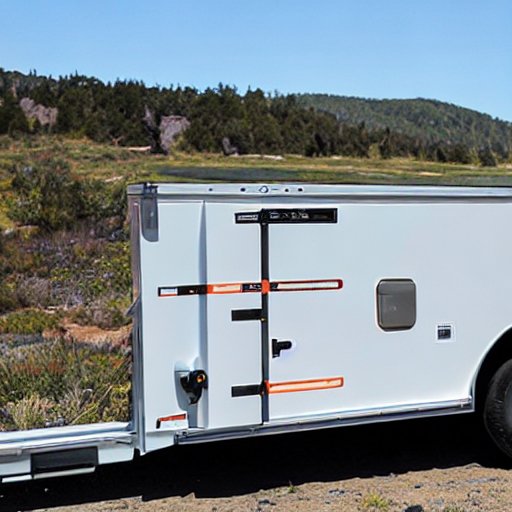Yo, what’s up, folks? It’s your boy, Matthew, back again with another blog post! Today, we’re gonna talk about a topic that’s often misunderstood by many people – GVWR.
What is it, you ask? Well, GVWR stands for Gross Vehicle Weight Rating, and it’s basically the maximum weight your trailer can handle, including the weight of the trailer itself, cargo, passengers, and any other items you plan to haul.
But wait, don’t stop reading yet! I promise this isn’t going to be a boring post filled with technical jargon. In fact, I’m gonna start this off with a funny story related to the topic. So, here it goes…
A few years back, my buddies and I decided to go on a fishing trip.
We rented a trailer to haul all our gear and loaded it up with coolers, tents, fishing rods, and the works. But as we were driving, we noticed that the trailer was swaying back and forth. We tried to adjust the load, but it didn’t help much.
Finally, we decided to pull over and check the trailer’s weight. And you know what? It was way over the GVWR!
No wonder it was swaying like crazy. We had to unload some of the stuff and redistribute the weight, which was a major pain in the butt. So, lesson learned – always check your GVWR before you hit the road!
Fun Fact: Did you know that the GVWR is required by law to be posted on every trailer? Yup, that’s right. So, if you can’t find it, it’s either because you’re blind or the manufacturer screwed up. Just kidding, it’s probably hidden somewhere on the frame or hitch.
So, Does GVWR Mean How Much Weight You Can Put on a Trailer?
The short answer is yes.
The GVWR is the maximum weight your trailer can handle, and you should never exceed it. But wait, there’s more to it than just that. Let’s dive in deeper and break it down into bite-sized pieces.
Table of Contents
Understanding the GVWR and Its Components
First things first, let’s define some terms. The GVWR includes the weight of the trailer itself, any cargo you’re hauling, plus the weight of all passengers and anything else in the vehicle.
So, if you’re planning to tow a trailer and bring along a bunch of friends or family, you’ll need to factor in their weight, too.
Calculating Your Trailer’s GVWR
Calculating your trailer’s GVWR is a simple process. All you need to do is add up the weight of your trailer and everything you plan to put in it, including fuel, water, and propane.
Then, add the weight of all passengers and any other items you’ll be hauling in your towing vehicle. This number should not exceed the GVWR specified by the manufacturer.
The Consequences of Overloading Your Trailer
If you overload your trailer, you’re not only putting yourself and others in danger, but you’re also breaking the law.
Overloaded trailers are more likely to sway, which can lead to loss of control and accidents. In addition, you may receive a fine for violating weight restrictions, which can be hefty.
Tips for Staying Within Your Trailer’s GVWR
Now that you know the importance of staying within your trailer’s GVWR, here are some tips to help you do just that.
First, be mindful of the weight of the items you’re planning to haul. Don’t just throw everything in there without considering the impact on the total weight. Second, distribute the weight evenly throughout the trailer to minimize swaying.
Third, check your tire pressure and make sure it’s at the recommended level for the weight you’re carrying. And finally, always double-check your GVWR before hitting the road.
FAQ
What happens if I exceed my trailer’s GVWR?
If you exceed your trailer’s GVWR, you risk putting yourself and others in danger as overloaded trailers are more likely to sway, leading to accidents. In addition, you may receive a fine for violating weight restrictions, which can be hefty.
Where can I find my trailer’s GVWR?
By law, the GVWR is required to be posted on every trailer. The manufacturer usually places it on the frame or hitch, but if you can’t find it, check the owner’s manual or contact the manufacturer.
Do I need to factor in the weight of passengers when calculating my trailer’s GVWR?
Yes, the GVWR includes the weight of the trailer itself, any cargo you’re hauling, plus the weight of all passengers and anything else in the vehicle.
How do I calculate my trailer’s GVWR?
Calculating your trailer’s GVWR is a simple process. All you need to do is add up the weight of your trailer and everything you plan to put in it, including fuel, water, and propane.
Then, add the weight of all passengers and any other items you’ll be hauling in your towing vehicle. This number should not exceed the GVWR specified by the manufacturer.
How can I stay within my trailer’s GVWR?
To stay within your trailer’s GVWR, be mindful of the weight of the items you’re planning to haul, distribute the weight evenly throughout the trailer to minimize swaying, check your tire pressure, and always double-check your GVWR before hitting the road.
My Conclusion
In conclusion, knowing your trailer’s GVWR is crucial for a safe and enjoyable trip.
Don’t be like my buddies and me on our fishing trip, struggling to keep our overloaded trailer from swaying all over the place. Be smart, calculate your GVWR, and stick to it. Happy hauling, y’all!
